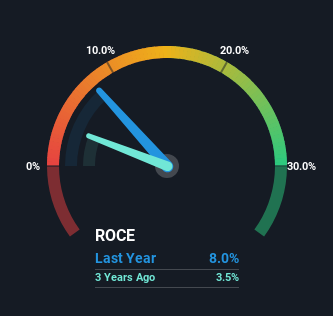- United States
- /
- Medical Equipment
- /
- NYSE:BSX
Boston Scientific (NYSE:BSX) Is Reinvesting At Lower Rates Of Return

What trends should we look for it we want to identify stocks that can multiply in value over the long term? Firstly, we'd want to identify a growing return on capital employed (ROCE) and then alongside that, an ever-increasing base of capital employed. Put simply, these types of businesses are compounding machines, meaning they are continually reinvesting their earnings at ever-higher rates of return. Having said that, from a first glance at Boston Scientific (NYSE:BSX) we aren't jumping out of our chairs at how returns are trending, but let's have a deeper look.
Understanding Return On Capital Employed (ROCE)
For those who don't know, ROCE is a measure of a company's yearly pre-tax profit (its return), relative to the capital employed in the business. Analysts use this formula to calculate it for Boston Scientific:
Return on Capital Employed = Earnings Before Interest and Tax (EBIT) ÷ (Total Assets - Current Liabilities)
0.08 = US$2.4b ÷ (US$35b - US$4.9b) (Based on the trailing twelve months to December 2023).
Thus, Boston Scientific has an ROCE of 8.0%. On its own, that's a low figure but it's around the 9.4% average generated by the Medical Equipment industry.
See our latest analysis for Boston Scientific

Above you can see how the current ROCE for Boston Scientific compares to its prior returns on capital, but there's only so much you can tell from the past. If you'd like to see what analysts are forecasting going forward, you should check out our free analyst report for Boston Scientific .
What Does the ROCE Trend For Boston Scientific Tell Us?
When we looked at the ROCE trend at Boston Scientific, we didn't gain much confidence. Over the last five years, returns on capital have decreased to 8.0% from 11% five years ago. However, given capital employed and revenue have both increased it appears that the business is currently pursuing growth, at the consequence of short term returns. If these investments prove successful, this can bode very well for long term stock performance.
On a side note, Boston Scientific has done well to pay down its current liabilities to 14% of total assets. That could partly explain why the ROCE has dropped. What's more, this can reduce some aspects of risk to the business because now the company's suppliers or short-term creditors are funding less of its operations. Some would claim this reduces the business' efficiency at generating ROCE since it is now funding more of the operations with its own money.
The Bottom Line On Boston Scientific's ROCE
In summary, despite lower returns in the short term, we're encouraged to see that Boston Scientific is reinvesting for growth and has higher sales as a result. And the stock has followed suit returning a meaningful 83% to shareholders over the last five years. So while the underlying trends could already be accounted for by investors, we still think this stock is worth looking into further.
Boston Scientific does have some risks though, and we've spotted 2 warning signs for Boston Scientific that you might be interested in.
For those who like to invest in solid companies, check out this free list of companies with solid balance sheets and high returns on equity.
Valuation is complex, but we're here to simplify it.
Discover if Boston Scientific might be undervalued or overvalued with our detailed analysis, featuring fair value estimates, potential risks, dividends, insider trades, and its financial condition.
Access Free AnalysisHave feedback on this article? Concerned about the content? Get in touch with us directly. Alternatively, email editorial-team (at) simplywallst.com.
This article by Simply Wall St is general in nature. We provide commentary based on historical data and analyst forecasts only using an unbiased methodology and our articles are not intended to be financial advice. It does not constitute a recommendation to buy or sell any stock, and does not take account of your objectives, or your financial situation. We aim to bring you long-term focused analysis driven by fundamental data. Note that our analysis may not factor in the latest price-sensitive company announcements or qualitative material. Simply Wall St has no position in any stocks mentioned.
About NYSE:BSX
Boston Scientific
Develops, manufactures, and markets medical devices for use in various interventional medical specialties worldwide.
Proven track record with adequate balance sheet.
Similar Companies
Market Insights
Community Narratives



